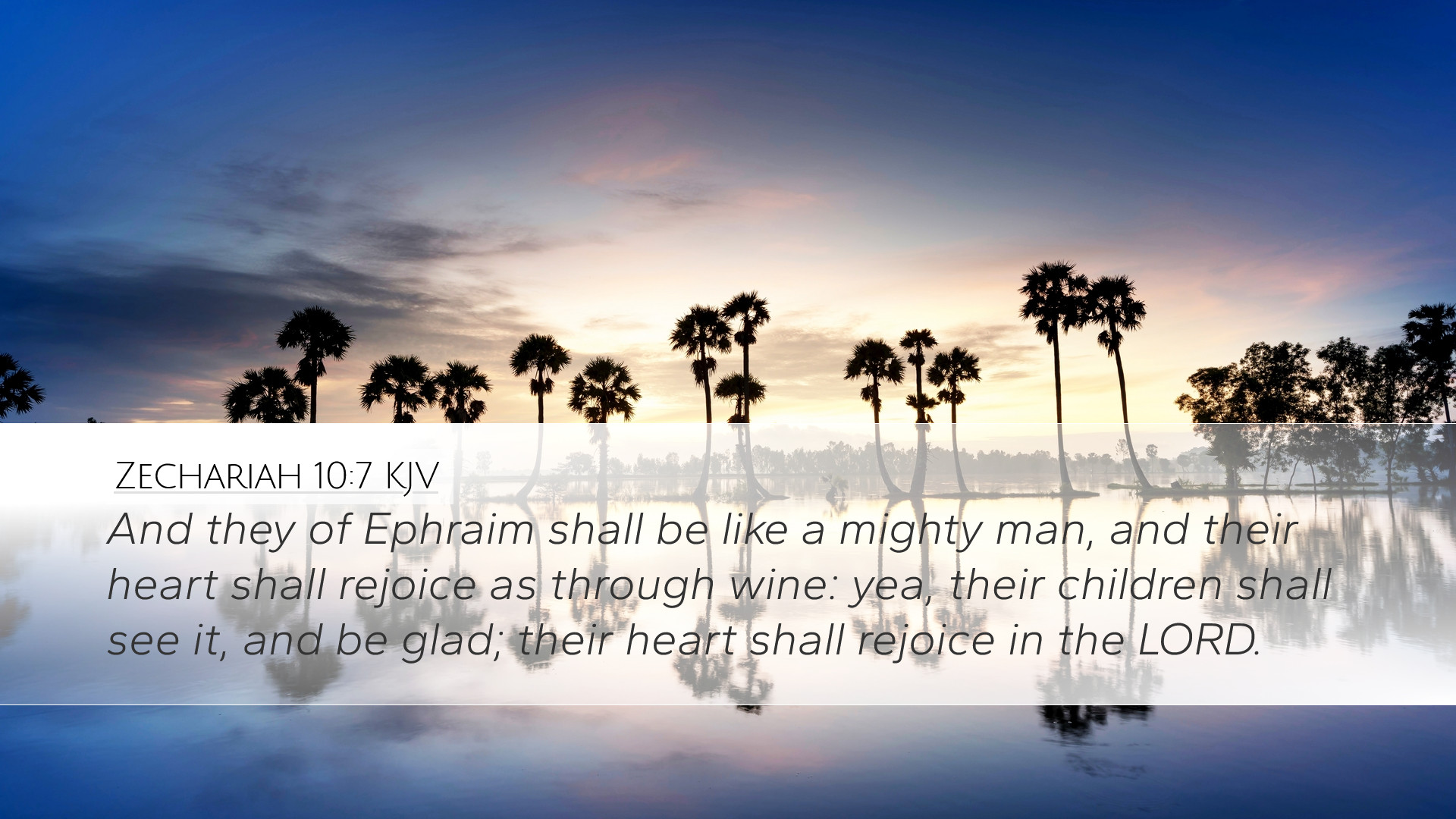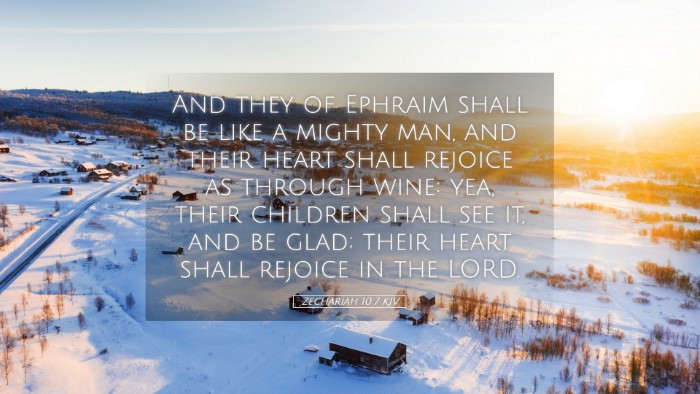Old Testament
Genesis Exodus Leviticus Numbers Deuteronomy Joshua Judges Ruth 1 Samuel 2 Samuel 1 Kings 2 Kings 1 Chronicles 2 Chronicles Ezra Nehemiah Esther Job Psalms Proverbs Ecclesiastes Song of Solomon Isaiah Jeremiah Lamentations Ezekiel Daniel Hosea Joel Amos Obadiah Jonah Micah Nahum Habakkuk Zephaniah Haggai Zechariah MalachiZechariah 10:7
Zechariah 10:7 KJV
And they of Ephraim shall be like a mighty man, and their heart shall rejoice as through wine: yea, their children shall see it, and be glad; their heart shall rejoice in the LORD.
Zechariah 10:7 Bible Commentary
Commentary on Zechariah 10:7
Verse: "And they of Ephraim shall be like a mighty man, and their heart shall rejoice as through wine: yea, their children shall see it, and be glad; their heart shall rejoice in the Lord." (Zechariah 10:7)
Introduction
The book of Zechariah, a post-exilic text, addresses God's restoration of Israel and the coming of the Messiah. Zechariah 10:7 presents a promising future for the people, particularly the tribe of Ephraim, characterized by joy, strength, and confidence in the Lord. This commentary synthesizes insights from various public domain sources to explore the implications of this profound verse.
Contextual Background
The historical context of Zechariah includes the return of the Jewish exiles from Babylon and the rebuilding of the temple. The people were facing disillusionment amid their struggles and disappointments. Zechariah's prophecies are thus infused with hope, emphasizing that God's intentions for His people involve restoration and revitalization.
Exegesis of Key Elements
Ephraim as a Symbol of Strength
Matthew Henry remarks that Ephraim symbolizes strength and vitality among the tribes of Israel. As God's chosen instrument, Ephraim represents God's assurance of restoration. The use of "mighty man" here reflects the idea of inner strength and valor imparted by divine intervention.
Joy Comparable to Wine
Albert Barnes elucidates that the joy described in this verse is akin to that experienced through the consumption of wine. It denotes exuberance and indulgence in blessings. The metaphor implies a fullness of joy stemming from God’s active presence and favor. This joy transcends mere happiness; it is rooted in spiritual fulfillment and community celebration.
Future Generations' Response
The verse also highlights the reaction of Ephraim's children, indicating that they will witness this restoration and will rejoice in the Lord. Adam Clarke emphasizes the significance of this generational transference of joy and faith. The children’s gladness reflects the communal aspect of Israelite culture, where individual faith experiences serve to strengthen the collective identity.
Theological Implications
Divine Restoration
This verse underscores God's commitment to restoring His people. The imagery of "mighty man" implies not only physical strength but also spiritual vitality. God’s promise transcends historical adversities and engages with the heart of the community. Restoration is not merely a return to previous conditions but involves an elevation to a state of joy and strength.
The Importance of Joy in Worship
Joy plays a crucial role in the life of faith. The comparison of joy to wine suggests that Christians are to perceive their relationship with God as one filled with delight, fostering an atmosphere of celebration. Worship should embody this joy, acting as both an expression of gratitude and a reflection of who God is.
Practical Applications
- For Pastors and Leaders: Foster an environment within the church that nurtures joy through worship and community activities.
- For Students of Theology: Reflect on the significance of generational faith and how past experiences of God's faithfulness can promote joy.
- For Counseling and Ministry: Recognize the transformative power of God’s presence in healing past traumas and restoring joy to individuals and communities.
Conclusion
Zechariah 10:7 offers a profound affirmation of God's character and intentions toward His people. As we reflect on the strength, joy, and communal aspects of this verse, we are reminded of the overarching narrative of restoration that flows throughout Scripture. This passage invites believers to rejoice in the Lord and to anticipate His continual work among us, evidenced not only in our lives but also in the lives of future generations.


